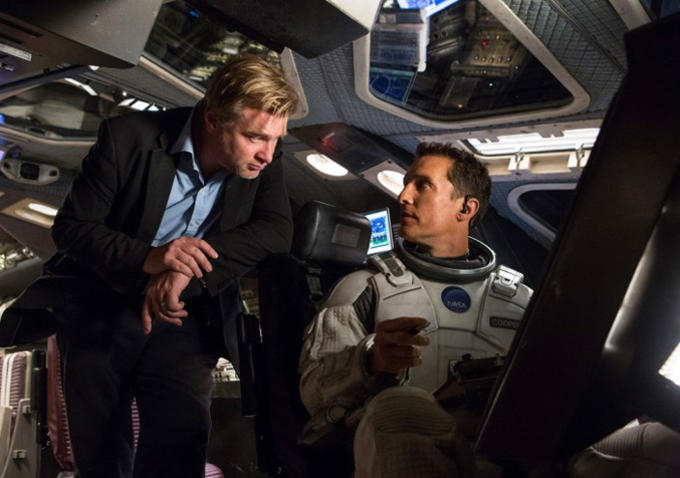Reviews include Deadpool & Wolverine, Doubles, and Mountain Queen: The Summits of Lhakpa Sherpa.
Too Many Cooks: Stirring Christopher Nolan’s Critical Broth
November 13, 2014

Arriving just ahead of prestige season like an overstuffed (American) Thanksgiving turkey, Interstellar opened last week to the sorts of big-picture debates Christopher Nolan films so frequently engender. Among the damage, consider the IMDb boards devoted to cryptic arcana involving quantum bedrooms and the elastic nature of time, the requisite spitballing among armchair accountants about whether a $50 million or so opening is good or lacking for a big name like Nolan, and the alternately self-congratulatory and confused back-and-forths over whether the science, inspired by executive producer Kip Thorne, was accurate, awesome, muddled, or just hard to hear amidst the bowel-rattling IMAX soundscape.
Perhaps the most distressingly familiar of these talking points—going as far back as Inception— is the online debate over whether Interstellar falls prey to the usual Nolan onslaught of exposition and potential plot holes, and, related to that, over whether critics ought to call such things out or get swept up in “the experience,” like a certain alien planet’s tidal wave. In one corner of the internet you have naysayers resisting Nolan’s bombastic, inchoate charms. In another, both staunch Nolan defenders and new converts either claim that there are no significant plot holes to fall through, or no good reason not to tumble through them in the first place. Banging the drum loudest for this troupe, Nolan himself insists to The Daily Beast that such complaints are merely the product of “knee-jerk tweets by people who’ve only seen the film once.” Good critics, a version of this refrain goes, appreciate the film for what it is, preferably over multiple consecutive screenings, while dull, self-serving ones approach it as the impetus for their own quixotic crusade against the filmmaker.
What is it about Nolan and his filmography that inspires such prescriptive, reactionary discussions about what critics ought to do? And what does it mean, anyway, to take Interstellar purely for what it is on its own terms as opposed to what it could mean to the errant critic? Good critics do, of course, write about what a film is; as if that were in doubt. As anyone who has taught aspiring humanities scholars in any capacity has found themselves saying at some point, good criticism often begins with close reading, the formalist impulse to notice a telling detail, decipher its significance in the context of the whole, and move outward from there, lest we jump past the trees en route to the forest. We teach our burgeoning critics to read closely first, the thinking goes, because it is a foundational skill. Sure, then: good critics of Interstellar probably write about what Interstellar is: an earnest humanist space melodrama, for example, or a decent, very long riff on the gentle inter-generational metaphysics of Frequency, swapping the radio for an intergalactic library.

It’s possible that such genre-bound insights and close-hewn formal critiques are rare, as the Nolan faithful hung up on the detractors seem to suggest. That recalls the charge of Alejandro Gonzales Iñarrítu, who recently pit his titular hero in Birdman against a straw-woman critic who, for all her strong opinions, is apparently unable to appreciate how the very play she hates is made. What though, of the underside of fetishizing this detail-oriented, narrative-thread tracing criticism at the expense of, say, a more personally or politically engaged kind? What is the quality that sets the good critic wrapped up in the very serious, chin-stroking work of sorting Interstellar’s inter-dimensional plot twists and suppositions on wormholes apart from the work of a computational device, taking an exhaustive inventory?
And what of the second part of the aggregate Nolan defender’s thesis: that dullness is endemic to any criticism that strays from the filmmaker’s intentions, revealed only after the most fine-tuned analysis of the film —somewhere around the third screening? Is the critic who skeptically notes Nolan’s penchant for stories about genius men with dead wives and estranged children out of bounds for bringing the artist’s queasy gender politics into play, or is he safe for doing the Nolan-approved work of scrupulous annotation? (For those keeping score, Ignatiy Vishnevetsky quips in his review for the A.V. Club, Interstellar brings the filmmaker’s dead wife count up to five.) On the other hand, what about critics who engage with Interstellar in all its goofy sincerity, plot holes and all, precisely because it makes them feel things? “It’s a mess, indefensible and ridiculous,” Walter Chaw writes in his open-hearted defense for Film Freak Central, “and it reminded me of my little girl and how when I’m with my kids, no expression of affection is too large or embarrassing. I loved it.”
This is not to propose that such extra-textual frames are the only ones worth reading a film like Interstellar through, although they certainly have their place at the table. Nor is it to suggest that looking squarely at a film’s formal construction is an act of critical juvenilia, a thing one gets over after one’s adolescence, as one graduates to more sophisticated arguments. But one wonders if the effort to circumscribe the sorts of criticism a film like Interstellar ought to yield is not a more pernicious threat than all those big, gaping, inter-dimensional plot holes.



